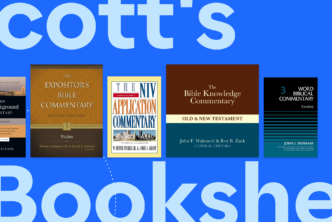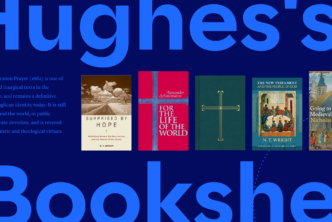Get wisdom, get understanding; do not forget my words or turn away from them.
Proverbs 4:5
Wisdom and understanding are everywhere available but are nevertheless ostensibly rarely found. A student of the Word must be diligent in their search but there are least two problems in their way.
A Couple Problems
First, with such a wealth of information, where does one start? Certainly, if the writing of many books is endless, then the reading of the same is doubly so. If you attend a school, then a teacher can guide your reading. But does that mean that everyone should embark on lengthy and expensive degree programs in the hopes that they will gain a better understanding of the scriptures? Certainly, this is sufficient. But is it necessary?
The second problem is money. If we are to follow such a goal, the cost is heavy. It may be worth it, but only time will tell.
In this post, I will address these problems head-on. I intend to show you a cost-free way to experience a seminary education. All you need to invest is time.[1] If you’ve graduated seminary and already forgotten much of what you’ve learned, here are a number of low- to no-cost options to keep you sharp.
I am regularly astounded at the resources available to the Body of Christ, including both leaders and laypeople. Places like biblicaltraining.org and biblicalelearning.org offer seminary-level courses for free. There are also several schools that make courses available for free on iTunesU. Other outlets like Credo Courses offer various classes and entire programs at a reasonable price. Credo also regularly makes courses available at steep discounts, along with relevant teaching and study material. There are also a wide variety of free resources readily available on YouTube.
Replicating the Graduate Degree
Here’s the question that drives the rest of this post: could someone replicate my graduate degree[2] through these sources? Could such a thing be done? A little bit of time, and whole lot of caffeine answered that question. I present to you a hypothetical 60-unit Degree in Biblical Studies: 1,300 hours in all![3] All of these “courses” are taught by professors with earned doctorates from top universities. The majority are well-known and well-respected scholars in their fields.
Biblical Studies
New Testament Survey
| Intro to the NT: Gospels and Acts | Craig Blomberg (Denver Seminary) | 22 hours |
| Intro to the NT: Romans to Revelation | Craig Blomberg (Denver Seminary) | 27 hours |
| Introduction to New Testament | Dale B. Martin (Yale) | 20 hours |
| New Testament Survey: Gospels | Robert Stein (Bethel Seminary, SBTS) | 21 hours |
| New Testament Survey: Acts to Revelation | Robert Stein (Bethel Seminary, SBTS) | 21 hours |
| New Testament: Its Structure, Content, and Theology | Bill Mounce (GCTS, APU) | 26 hours |
Old Testament Survey
| Old Testament Survey | Douglas Stuart (GCTS) | 17 hours |
| Introduction to the Old Testament | Christine Hayes (Yale) | 8 hours |
Greek & Old Testament Exegesis
| Biblical Greek | Bill Mounce (GCTS, APU) | 8 hours |
| Greek Exegesis I | David Farnell (TMS) | 21 hours |
| Greek Exegesis II | David Farnell (TMS) | 21 hours |
| Proverbs | Bruce Waltke (Regent College, DTS, WTS, RTS) | 27 hours |
| Psalms | Bruce Waltke (Regent College, DTS, WTS, RTS) | 27 hours |
| Job | John Walton (Wheaton) | 9 hours |
Hebrew & New Testament Exegesis
| Hebrew I | Bill Barrick (TMS) | 25 hours |
| Hebrew II | Bill Barrick (TMS) | 26 hours |
| Hebrew Exegesis I | Bill Barrick (TMS) | 13 hours |
| Hebrew Exegesis II | Bill Barrick (TMS) | 17 hours |
| Galatians | Douglas Moo (TEDS, Wheaton) | 18 hours |
| Hebrews | George Guthrie (Regent College) | 17 hours |
| Acts | Craig Keener (Asbury) | 24 hours |
| Romans | Douglas Moo (TEDS, Wheaton) | 16 hours |
| Romans | Craig Keener (Asbury) | 16 hours |
| Matthew | Craig Keener (Asbury) | 19 hours |
| 1 Corinthians | Gary Meadors (GRTS) | 30 hours |
| Revelation | Robert Mulholland (Asbury) | 25 hours |
Theology & History
| Church History I | Gerald Bray (Beeson) | 15 hours |
| Early and Medieval Church History | Ryan Reeves (GCTS) | 27 hours |
| Church History II | Gerald Bray (Beeson) | 26 hours |
| Reformation and Modern Church History | Ryan Reeves (GCTS) | 20 hours |
| Systematic Theology I | Bruce Ware (SBTS, TEDS) | 28 hours |
| Systematic Theology II | Bruce Ware (SBTS, TEDS) | 27 hours |
| Biblical Theology | Greg Beale (GCTS, WTS) | 22 hours |
Philosophy, Ethics, Etc.
| Christian Ethics | Ronald Nash (RTS, SBTS) | 16 hours |
| Christian Apologetics | Ronald Nash (RTS, SBTS) | 15 hours |
| History of Philosophy and Christian Thought | Ronald Nash (RTS, SBTS) | 20 hours |
| History of Philosophy and Christian Thought | John Frame (RTS, WTS) | 35 hours |
| History of Ancient Philosophy | Adam Rosenfeld (UNC-Greensboro) | 30 hours |
| History of Modern Philosophy | Adam Rosenfeld (UNC-Greensboro) | 26 hours |
| Introduction to Philosophy | Daniel Bonevac (UT-Austin) | 33 hours |
| Introduction to Philosophy | John T. Sanders (RIT) | 15 hours |
| A History of Philosophy | Arthur Holmes (Wheaton) | 80 hours |
| Ancient and Medieval Philosophy | David O’Connor (Notre Dame) | 16 hours |
| Philosophy and Christian Thought | Ike Shepardson (TKU) | 9 hours |
Electives
| Old Testament Theology | Paul House (Beeson, SBTS, Wheaton) | 20 hours |
| New Testament Theology | Frank Thielman (Beeson) | 14 hours |
| Historical Theology I | Nathan Busenitz (TMS) | 25 hours |
| Historical Theology II | Nathan Busenitz (TMS) | 27 hours |
| Pastoral Epistles | Bill Mounce (GCTS, APU) | |
| Textual Criticism | Daniel Wallace (DTS) | 18 hours |
| Cultural World of the New Testament | David deSilva (Ashland Theological Seminary) | 8 hours |
| Apocrypha | David deSilva (Ashland Theological Seminary) | 9 hours |
| Old Testament Backgrounds | Donald Fowler (Liberty) | 23 hours |
| Lewis and Tolkien | Ryan Reeves (GCTS) | 14 hours |
| Luther and Calvin | Ryan Reeves (GCTS) | 17 hours |
| Early Middle Ages | Paul Freedman (Yale) | 17 hours |
| Symbolic Logic | John T. Sanders (RIT) | |
| The London Latin Course | Evan Millner | 14 hours |
| Doctrine of Christ | William Lane Craig (Biola, HBU) | 32 hours |
| The Atonement | William Lane Craig (Biola, HBU) | 10 hours |
| The Analytic Tradition | Daniel Bonevac (UT-Austin) | 30 hours |
| Ideas of the Twentieth Century | Daniel Bonevac (UT-Austin) | 32 hours |
To view and/or make a copy of this entire list along with the rough course equivalent information, click here.
This is far from exhaustive. There are many courses, for instance, over at biblicaltraining.org that I have not included. If one wanted to focus more on ministry classes, that could be done. There are also around 1,300 different courses on all manner of subjects listed here. My goal here was just to show what one could do if they wanted something like the information from an MA in Biblical Studies without the physical, paper credential.
Work Arounds for Remote Learning
It must be said that there is potentially much to be lost by not being in classrooms or in direct contact with professors. However, these problems can be mitigated. There are top-level scholars who blog (see for instance Larry Hurtado’s excellent blog.[5] There are also several scholars actively engaged in Facebook groups like Nerdy Language Majors and Nerdy Theology Majors (among many other groups). If you are struggling with Greek, go to NLM and post a question. It might be answered by venerable Greek scholars like William Varner or Robert Plummer (among others).
Indeed, there is so much scholarly engagement on social media that it cannot all be listed here.[6] So, while you may miss out on the classroom experience, the internet has enabled virtual experiences that might be just as good (or perhaps better in some cases). Additionally, many seminaries make their course outlines available online for free, giving the diligent, self-starting student suggestions for textbooks, reading lists, and even writing assignments (you’ll just have to find an honest person to read and critique your work).
This is not to mention the incredible resources that are out there for a small investment of real money. Many seminaries will allow students to audit courses for a nominal fee. Additionally, as I mentioned before, Credo Courses offers a broad range of courses from top-level scholars. These courses are usually very reasonably priced. However, they are occasionally free. For instance, over the Easter weekend, Dr. Gary Habermas’ excellent course on the Resurrection of Jesus was completely free! This included audio, video, and various resources. Over the past year, I’ve been fortunate enough to compile several of their audio courses for free. I recently finished out my collection when they made all of their audio courses free during the first week of July. There are also excellent exegetical resources at Biblearc.com that include Hebrew, Arcing, and Bracketing.
Perhaps the best resource available at a nominal cost is the various Mobile Ed courses offered through Logos. There is nowhere else you could go to get courses that integrate so flawlessly into your exegetical work in Logos Bible Software. Additionally, every month there are free books available through Logos, and occasionally that “book” is a course. Two books (or courses) are added to the free one each month at a steep discount. Speaking of affordable books, you can also custom tailor subscriptions to BookBub to get email updates for discounted Kindle books.[7]
The Bottom Line
I am a professor at a Bible college, and an alumnus of that same college as well as a highly-respected seminary. I wouldn’t trade those experiences for anything. I’m not suggesting that everyone should forgo formal education in favor of the excellent free (or cheap) options I’ve shown above. But the preponderance of resources now open doors for those who might not have either the means or the inclination for a Bible college or seminary experience. Open doors can be a very good thing, especially when those open doors lead to access to excellent resources without the encumbrance of debt.
So with these free options at hand, may we all grow to understand our calling, and in all our understanding may the Lord grant us the wisdom to pursue it for the sake of his glory, his name and his kingdom.
Notes
[1] See the advice from Craig Blomberg on how to leverage this invaluable asset that is available to us all.
[2] I hold a 60-unit MA from Gordon-Conwell.
[3] This is loosely based on the MA in Biblical Studies offered by Gordon-Conwell, my alma mater.
[4] A few explanatory notes. In case you aren’t familiar with a particular scholar, I’ve included the institution with which they are affiliated in parenthesis. Many of these are well known enough that I’ve abbreviated them (GCTS – Gordon-Conwell Theology Seminary or TEDS – Trinity Evangelical Divinity School).
[5] I should say, however that his blog may be quiet for some time while he undergoes chemotherapy. Please be in prayer for him during this time.
[6] For instance, if you aren’t taking advantage of Daily Dose of Greek and/or Daily Dose of Hebrew, then you are seriously missing out.
[7] I understand the reticence to adopt Kindle books. I also prefer physical books. But pricing for these books make it regularly worth it. On more than one occasion NT Wright’s Paul and the Faithfulness of God has been available for $4.





